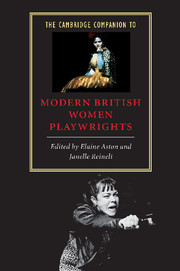Book contents
- Frontmatter
- 1 A century in view: from suffrage to the 1990s
- Part I Retrospectives
- Part II National tensions and intersections
- Part III The question of the canon
- Editors’ note
- 10 Pam Gems: body politics and biography
- 11 Caryl Churchill and the politics of style
- 12 Violence, abuse and gender relations in the plays of Sarah Daniels
- Part IV The subject of identity
- Index
10 - Pam Gems: body politics and biography
from Part III - The question of the canon
Published online by Cambridge University Press: 28 May 2006
- Frontmatter
- 1 A century in view: from suffrage to the 1990s
- Part I Retrospectives
- Part II National tensions and intersections
- Part III The question of the canon
- Editors’ note
- 10 Pam Gems: body politics and biography
- 11 Caryl Churchill and the politics of style
- 12 Violence, abuse and gender relations in the plays of Sarah Daniels
- Part IV The subject of identity
- Index
Summary
Now in her seventies, Pam Gems’s life-time almost coincides with the time-line of this volume. While she has a prolific output - Gems is the author of some twenty plays and has adapted a number of European classics by writers such as Duras, Chekhov, Ibsen and Lorca - her life in the theatre spans a much briefer period, with her work for the stage not gaining recognition until the 1970s. Hers is not a success-glamour-story, but - similar to the narratives of so many of the 'great' women, and occasionally men, whom Gems explores in her revisionist style of biographical theatre - is one of hardship and struggle; of a life, in and out of the theatre, disadvantaged by both class and gender.
Born in 1925, Gems was raised by her widowed mother in harsh material circumstances. She left school at fifteen, held a variety of jobs, and served as a Wren during the Second World War, which entitled her to a university place. Like so many women in the 1950s, Gems gave up work (she had a research job with the BBC), and was kept busy raising a family of four children, which, like Churchill, she combined with writing for television and radio. Only when the family moved back up to London from the Isle of Wight in 1970 was she able to begin writing for theatre, as the move to the capital brought her into direct contact with the Women’s Movement and with fringe theatre.
- Type
- Chapter
- Information
- The Cambridge Companion to Modern British Women Playwrights , pp. 157 - 173Publisher: Cambridge University PressPrint publication year: 2000
- 1
- Cited by



